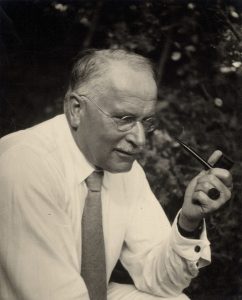 Carl Gustav Jung was born on July 26, 1875, in Kesswil, Switzerland. He was the only surviving son of Paul Achilles Jung, a rural pastor, and Emilie Preiswerk Jung. Jung’s early life was marked by his fascination with spiritual and supernatural phenomena, which later influenced his interest in the psychological aspects of religion (Bair, 2003).
Carl Gustav Jung was born on July 26, 1875, in Kesswil, Switzerland. He was the only surviving son of Paul Achilles Jung, a rural pastor, and Emilie Preiswerk Jung. Jung’s early life was marked by his fascination with spiritual and supernatural phenomena, which later influenced his interest in the psychological aspects of religion (Bair, 2003).
Jung attended the University of Basel, where he studied medicine from 1895 to 1900. During his time at the university, he became increasingly drawn to psychiatry and psychology, and his exposure to the works of Sigmund Freud, Pierre Janet, and Eugen Bleuler further fueled his passion for understanding the human mind (Storr, 2013).
In 1900, Jung began working at the Burghölzli Psychiatric Hospital in Zurich under the supervision of Eugen Bleuler, a pioneering psychiatrist who would later coin the term “schizophrenia.” At Burghölzli, Jung conducted groundbreaking research on schizophrenia, word associations, and the psychological basis of dreams, which formed the basis of his later theories on the unconscious (Shamdasani, 2018).
As mentioned earlier, Jung’s early work as a psychiatrist led him to collaborate with Sigmund Freud in the early 20th century. Their theoretical and personal differences eventually led Jung to develop his own unique approach to the study of the human psyche, known as analytical psychology (Storr, 2013).
In 1912, Jung published “Symbols of Transformation,” a book that marked his break from Freudian psychoanalysis and the beginning of his own theoretical framework. After this break, Jung continued to develop and refine his ideas on the collective unconscious, archetypes, and the process of individuation (Bair, 2003).
Throughout his life, Jung maintained a private practice in Zurich, where he treated patients and continued to develop his theories. He also traveled extensively, engaging with different cultures and religious traditions, which further informed his understanding of the human psyche (Stevens, 2017).
Jung made significant contributions to the field of psychology, including the development of the Myers-Briggs Type Indicator, a widely-used personality assessment tool based on his theories of psychological types. He also influenced the field of depth psychology, which explores the relationship between the conscious and unconscious mind (Storr, 2013).
Carl Gustav Jung passed away on June 6, 1961, in Küsnacht, Switzerland. His work continues to have a lasting impact on the fields of psychology, psychotherapy, and the study of religion, mythology, and the human mind (Stevens, 2017).